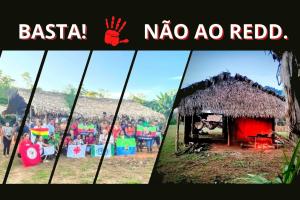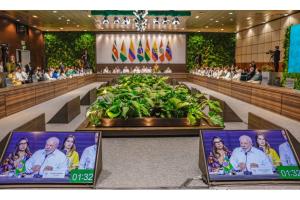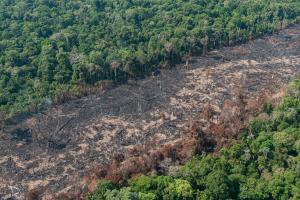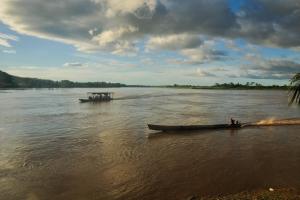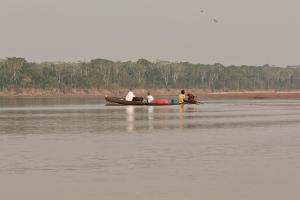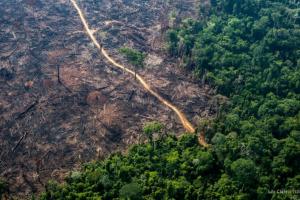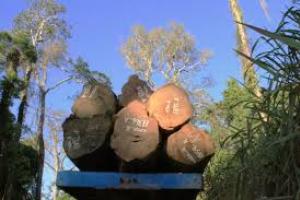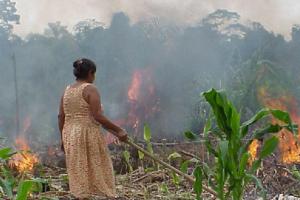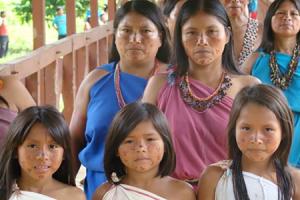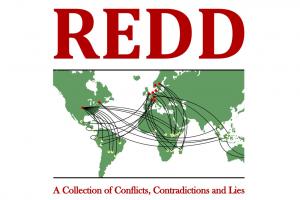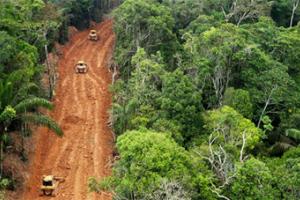DECLARATION OF REJECTION OF REDD IN TERRITORIES OF INDIGENOUS PEOPLES, AND PEASANT, TRADITIONAL AND AFRO-DESCENDENT COMMUNITIES OF LATIN AMERICA
Alto Turiaçu – July 2024
Bolivia
Action alerts
30 July 2024
Indigenous, peasant, traditional and Afro-descendent peoples from the Amazon region and Central America call organizations and social movements all over the world to endorse this declaration rejecting carbon projects in their territories.
Bulletin articles
27 February 2024
The Amazon Summit: Extractivism and violence in the name of the “bioeconomy” and of “sustainability”
Using the argument of “sustainable development”, governments in the Amazon region continue providing incentives for extractivism. In the face of this, indigenous leader Alessandra Munduruku vents her thoughts: “What we need is the demarcation of indigenous territories. Enough talk of bioeconomy, of sustainability, when there is violence in the here and now.”
Bulletin articles
27 February 2024
The Amazon region is one of the final frontiers of resistance to capital expansion. This is epitomized by the struggles of social activists such as Chico Mendes, as well as by the presence of most of the earth’s remaining indigenous peoples in voluntary isolation. However, different forms of ‘green’ extractivism are currently and increasingly advancing on this territory.
Bulletin articles
26 February 2024
The expanding agricultural frontier to grow soybean and oil palm, in addition to mining and the potential construction of mega-dams, are advancing upon the living spaces of indigenous and peasant communities. In late 2018, communities organized a coordinating committee to defend their territories and their right to a dignified life.
Bulletin articles
12 September 2022
The Beni River in the Bolivian Amazon is under threat. While the government seeks to install mega-dams that would flood an area much larger than the capital, La Paz, mining and its concomitant mercury contamination continue to bring illness to these territories.
Other information
15 July 2019
The study, “Amazonía en la encrucijada” (“The Amazon at the Crossroads”), by the Amazon Geo-Referenced Socio-Environmental Information Network (RAISG, by its Portuguese acronym) presents an overview of the pressure caused by roads in Brazil, Bolivia, Colombia, Ecuador, Perú and Venezuela. According to the report, of the 136,000 kilometers of roads mapped in the region, at least 26,000 are in protected natural areas and indigenous territories. For example, in the Brazilian Amazon, the report states that most deforestation occurs in the vicinity of roads.
Other information
22 December 2018
A team of journalists from five Latin American countries investigated how groups of timber traffickers manage to steal and process timber from the Amazon. An article from the newsportal Mongabay exposes how illegally-sourced timber from Peru, Bolivia, Brazil, Ecuador, and Colombia are incorporated into the international market with falsified official documents that are almost never verified.
Bulletin articles
9 July 2018
Fires in the Amazon are occurring more frequently and with greater intensity. But who is really burning the forests?
Bulletin articles
7 July 2017
How to make the sustainability of life the center of debate
Publications
3 December 2014
REDD: A Collection of Conflicts, Contradictions and Lies presents summaries of reports from 24 REDD projects or programmes with a common characteristic: they all show a number of structural characteristics that undermine forest peoples' rights, or fail to address deforestation. As offset projects, they all fail to address the climate crisis because by definition, offset projects do not reduce overall emissions: emission reductions claimed in one place justify extra emissions elsewhere.
Bulletin articles
4 July 2014
"They consider us the periphery of the periphery"
